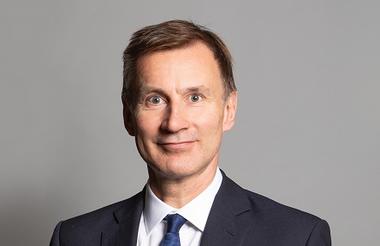NCVO has called on Jeremy Hunt to hold an urgent meeting with charity sector representatives after the chancellor met business leaders to discuss future energy bills support yesterday.
Hunt met private sector representatives including the Federation of Small Businesses (FSB), the Confederation of British Industry (CBI) and UK Hospitality yesterday lunchtime.
Despite suggestions beforehand that Hunt would share details at the meeting of what energy support businesses could expect after the Energy Bill Relief Scheme (EBRS) expires in March, attendees suggested they were not given any firm information.
NCVO and Pro Bono Economics (PBE) criticised the chancellor for failing to meet voluntary sector leaders as well, warning that charities must not be overlooked.
Businesses ‘still very much in the dark’
BBC News reported before yesterday’s meeting that government support for businesses’ energy bills could to be halved after March, but FSB said afterwards that the details remained unclear.
“Small firms are still very much in the dark on whether they’ll continue to be supported on energy bills when the current EBRS expires in March,” said Tina McKenzie, FSB policy chair.
“We made it clear in our meeting with the chancellor today that we can’t afford a cliff-edge scenario that would see a raft of business failures. The government must announce energy support plans as soon as soon as parliament returns next Monday.
“With the current scheme ending in three months, it’s been impossible for small firms to plan their 2023.”
Other attendees said they awaited further details from the government.
The government originally said it would announce the “significantly lower” post-March support by the end of 2022.
But Hunt confirmed at the meeting yesterday that the Treasury would announce the conclusion of the EBRS review in the House of Commons next week.
NCVO: ‘Charities must not be overlooked’
NCVO, alongside other charity sector umbrella bodies including CFG and ACEVO, has met government officials in recent months to discuss post-March energy support.
However, NCVO was not invited to the meeting with Hunt yesterday and the umbrella body called for urgent discussions on energy support as well as more regular contact in future.
“We are requesting that government urgently holds a meeting with charity sector representatives before anything is announced, and would also welcome the opportunity for regular meetings with the chancellor,” said Alex Farrow, director of influencing and engagement at NCVO.
“While businesses and charities have some shared support needs, charities face unique challenges and must not be overlooked. Donations are falling and running costs have risen dramatically. Charities cannot simply pass these costs on to their service users and over half of charities are already using reserves to cover operating costs. This is not sustainable.
“Societal need is deepening, inequalities are widening and there is a growing reliance on charities to underpin weakened community infrastructures and fill gaps due to public sector cuts. We therefore truly hope that government has listened to the alarm raised by charities and acts fast.”
‘Treasury’s relationship with sector must improve’
PBE said charities were just as affected by the government’s energy support and referred to its recent research that found voluntary sector representatives made up fewer than 3% of the members of the Treasury’s advisory groups, compared with 70% for those in the private sector.
“Charities are major public service providers, often at the heart of their communities, that provide evidence and insight which policymakers would otherwise struggle to find,” said Nicole Sykes, director of policy and communications.
“Deep and lasting collaborations between the two benefit both sides; helping charities to perform their roles more effectively and enabling government to improve policy and delivery. This in turn means better outcomes for taxpayers and charity beneficiaries alike.
“Charities on the frontline of the cost-of-living crisis are just as impacted by changes to the government’s EBRS as businesses. This gap between the Treasury and the social sector simply cannot continue.”
Related Articles












